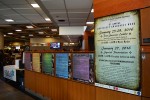The Post-Survivor Exhibit in Mystic Market, one of the busiest spots on campus. (photo by Chorong Kim)
The following remarks have been modified from the original address given during Hillel Victoria’s Second Annual Holocaust Awareness Presentation during Holocaust Awareness Week, which took place at the University of Victoria Jan. 25-29.
When my co-organizer, Dr. Kristin Semmens in the history department at the University of Victoria, and I embarked on planning Holocaust Awareness Week, we decided to put a call out for poster submissions to include in the Post-Survivor Exhibit to be publicly displayed in Mystic Market, one of the busiest spots on campus. The aim was to feature personal stories of post-survivors – UVic students who are descendants of Holocaust survivors – and we welcomed submissions from survivors of other genocides and atrocities. We thought that, between all the Jewish students and the diverse student body, we would be overflowing with submissions and would struggle to select 20 stories to include in the exhibit. As it turned out, our struggle was to get any submissions at all. Why am I sharing with you our experience of failed expectations? Well, it’s quite simple. This has been a learning experience for us, just as much as it has been for the students we approached to participate in the exhibit.
Many of the Jewish students said they knew very little about their grandparents or their survival story, and felt they didn’t have enough to write personal reflections about it. I was coming from the point of the view that you can write about “not having enough to write about” and attribute that to the implications of being a descendant of a survivor and the negative effects of post-Holocaust syndrome (a form of transferable post-traumatic stress disorder). Others didn’t want to share their story in public and recommended that we ask people to submit anonymously; some were too scared to be identified as Jews on campus. Both Kristin and I were not surprised by the reasons we received but, as advocates of Holocaust awareness and education, we thought the students could overcome their fear and disassociation from their family’s past.
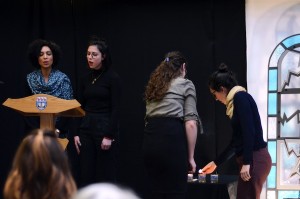
As a granddaughter of Holocaust survivors from Poland (and today Belarus) on my mother’s side and a granddaughter of interned Japanese-Canadians on my father’s side, I can tell you that there are two types of survivors. Those who talk and those who don’t. My maternal safta (grandmother) spoke about the Holocaust and would tell everyone that the only reason she survived was because of her blond hair and blue eyes, whereas, my other three grandparents chose to never talk about what happened to them. So much so, that my Japanese bachan and gichan (grandmother and grandfather) completely abandoned their Japanese heritage and opted to raise their children with English names and, tragically, my maternal saba (grandfather) couldn’t even recall the names or faces of his murdered first wife and baby girl. That’s how he dealt with his past.
I only know about my histories because I wanted to know about them and I asked questions. That got me thinking, how can I ask students to write about their stories if they haven’t gone through this process of asking yet? And who am I to pressure them to do so? I know now that I may have asked too much of the students. Perhaps we are not as ready as I thought to share our stories, let alone share them collectively as an international community.
I thank the handful of students who did send in poster submissions for their bravery in sharing their stories. Each one was on a different page in their personal journey to coping and understanding their family or nation’s past. Some already knew all the details while others had to ask their families for help in obtaining old photographs and putting all the bits and pieces of their grandparents’ stories together into one cohesive personal reflection. One of my students wrote to me on Facebook, “I just found out a ton of information that I didn’t know before, and I’m still kind of processing it”; another texted me saying that, although they have decided not to submit a story, this has started a personal desire to find out more about their family’s history. Coming to terms with the past is not easy, we all need healing and we all have the right to look to a brighter future.
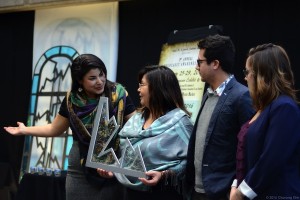
This weeklong exhibit and the presentation today have already served their purpose – Holocaust awareness. It was not smooth sailing organizing this event. The Holocaust is a very sensitive subject and everyone has their views on how to approach Holocaust education. I am very moved by the outpouring of support from participating organizations in our very diverse community. May this be an example of collaboration, tolerance, compassion and love towards our ultimate goal: peace on this campus, in our community and around the world.
Traditionally, during Holocaust commemorations, six memorial candles are lit to represent the six million Jewish lives lost in the Holocaust. Today, we have chosen to light seven memorial candles, to be lit by UVic students representing various communities and causes, with our seventh candle symbolizing our hope. Performing “Mi Ha’Ish” is post-doctoral fellow Dr. Orly Salama-Alber, accompanied by Hannah Faber, the volunteer coordinator of UVic’s Jewish Students Association, and the same song that has been incorporated into our gift to Dawn Smith, who performed the First Nations acknowledgement earlier. In English, the lyrics read: “Who desires life, loving each day to see good? Then guard your tongue from evil and your lips from speaking deceit. Turn from evil and do good, seek peace and pursue it.” (Psalm 34:12-4)
Our first candle will be lit by undergraduate students Shelly Selivanov, Paige Gelfer and Anat Kelerstein and master’s student Keenan Anthony, grandchildren of Holocaust survivors, and they will be lighting on behalf of the six million Jews who perished in the Shoah.
Our second candle will be lit by I-witness Field School student Cheryl Noon and history graduate student Kaitlin Findlay on behalf of all other persecuted victims of the Holocaust.
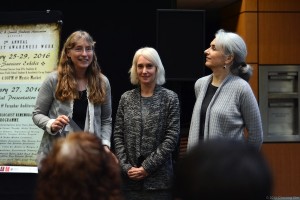
Our third candle will be lit by international students Moe Ezzine and Abbie Urquia, who are members of the African Awareness Club, on behalf of all the victims of genocide, including, but not limited to, the Armenian genocide, the Rwandan genocide, the Ukrainian genocide and, more recently, the Syrian genocide.
Our fourth candle will be lit by student advocates Lane Foster and Maks Zouboules from the Sexualized Violence Task Force on behalf of all victims of sexualized violence on and off campus.
Our fifth candle will be lit by undergraduate student Nicola Craig Hora and graduate student Lauren Thompson, who are co-designing a teaching unit on the Holocaust for high school students, on behalf of all the children whose lives were cut short and were robbed of their bright futures.
Our sixth candle will be lit by members of the Indigenous Law Students Association, Thomas Laboucan-Avirom and Rachelle Trenholm, on behalf of all victims of residential schools and Japanese internment camps here in Canada.
Our seventh and final candle, our candle of hope, will be lit by Multifaith Services work-study students Olivia Bos and Gabriela Turla, on behalf of all humanity, regardless of their race, religion, creed and sexual orientation.
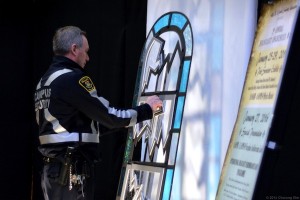
On stage, between the candles is our broken window. This window is shattered and represents Kristallnacht, the night of Nov. 9, 1938, on which a massive coordinated attack on Jews occurred and swept across Europe, marking the beginning of the Holocaust. This night is otherwise known as the Night of Broken Glass. Throughout this presentation, we will be reclaiming the broken pieces of glass and rebuilding this very window in a communal act of resilience.
The eight window pieces were placed by members or representatives of the following groups: 1) First Nations community; 2) UVic Multifaith Services; 3) Jewish Federation of Victoria and Vancouver Island; 4) UVic Holocaust educators; 5) Campus Security; 6) student leaders (Jewish Students Association, Indigenous Law Students Association, History Undergraduate Society, Multifaith Services work-study students, Germanic and Slavic studies students, I-witness Field School students, and student advocates from African Awareness Club and Sexualized Violence Task Force); 7) UVic administration (Equity and Human Rights Office); and 8) children of Holocaust survivors and members of the Kristallnacht planning committee.
It takes a community to overcome trauma and rebuild a peaceful future. It also takes a community to prevent trauma from happening in the first place.
Carmel Tanaka is the Hillel BC director at the University of Victoria, a granddaughter of Holocaust survivors and an advocate for Holocaust awareness.

